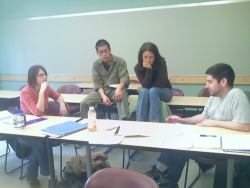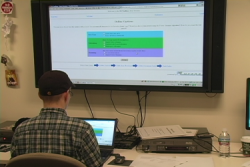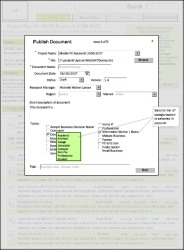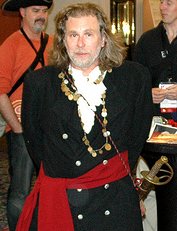Qualities: Practical Training
Although the Information School provided a great foundation on which to build, I had to mostly look outside the school to find opportunities to learn practical skills directly related to my chosen career path. At the suggestion of a few friends who were already practicing information architects, I investigated the courses offered in Technical Communication, the summer IA Institute, and the annual IA Summit.User-Centered Design

The TiddlyWiki Thesaurus UCD team
I registered for the TC 518: User-Centered Design course with the intention of learning about user-centered design methodology, tools, techniques, and tricks. The web-based software redesign project I worked on with the other three members of my team (Khue Duong, Marisa Haberfelde, and Ann Swearingen) provided ample opportunity to get "hands-on" experience with many user-centered design activities. I performed preliminary user and task analysis, created a persona, conducted an interview, wrote a product walkthrough and created a use scenario. Together with my team we performed wants and needs analysis, wrote a redesign proposal, conducted another wants and needs analysis combined with a cognitive walkthrough, applied heuristic evaluation, conducted a usability evaluation, analyzed our findings, produced a final report and gave a presentation to our class. I expect I may be involved with many of these activities in the future, in my professional career. This course project has allowed me to familiarize myself with these techniques and learn how to use them more effectively. Our final report and presentation give more details about the lessons we learned as we went through the process. More information about the project itself can be found here.
Usability Testing

Usability testing with one of our unfortunate participants
The TC 517: Usability Testing course focused on a team-based planning effort to design and implement a full usability study. My group focused on a web application called the IR Toolbox, and our usability tesing efforts were meant to inform a redesign of this tool. Much of our time in the course was devoted to learning techniques and methods, and then choosing which of these tools we would employ in our project. We prodcued a ![]() test kit containing several components including a brief participant survey, an administrator checklist and script, a consent form, data collection forms, a task list for the user to follow during the test, and a post study interview script. Once prepared, we ran a pilot study using two participants, and produced a
test kit containing several components including a brief participant survey, an administrator checklist and script, a consent form, data collection forms, a task list for the user to follow during the test, and a post study interview script. Once prepared, we ran a pilot study using two participants, and produced a ![]() final report detailing our findings. The entire course was very practical, allowing me to gain experience with various techniques. By the end I really appreciated some of the difficulties involved in devising and running a usability test, due to the problems we encountered. During the pilot study the test machine crashed and we resumed the test on an identical machine, which also crashed. Although we had run through the procedure successfuly ourselves, we discovered a certain amount of flexibility is needed to deal with unexpected events. In our study it may have helped to have a more reliable backup machine ready, to quickly resume the test when we encountered problems.
final report detailing our findings. The entire course was very practical, allowing me to gain experience with various techniques. By the end I really appreciated some of the difficulties involved in devising and running a usability test, due to the problems we encountered. During the pilot study the test machine crashed and we resumed the test on an identical machine, which also crashed. Although we had run through the procedure successfuly ourselves, we discovered a certain amount of flexibility is needed to deal with unexpected events. In our study it may have helped to have a more reliable backup machine ready, to quickly resume the test when we encountered problems.
Information Architecture Institute

Wireframe showing my AJAX dialog idea
This intensive, week long course was a life-changing experience for me. We were given a solid grounding in information architecture history, challenges, techniques, and methods. The truly rewarding (and nerve-wracking!) experience was the group project -- we had four days to produce a strategy, enough artifacts, and a presentation which we used to "pitch" our idea in the hopes of winning a contract. It was a role-playing exercise, of course, but we all took it very seriously and the teams produced some truly amazing work. Our teams were put together by the instructors to ensure a balance of students and professionals. The conversations and exchanges of ideas that took place in this context were as valuable as the course material itself. After presenting our design and sharing the strategy, personas, and wireframes we had created, the three instructors of the course provided extremely valuable "real-world" feedback on the strengths and weaknesses of our presentation. We learned not only from creating and giving our own "pitch" to the stakeholders, but learned by watching the other presentations and digesting the feedback each team received. I would imagine this experience is the closest one could come to participating in a real information architecture project within the confines of a classroom. It convinced me that I had a real interest in this sort of work, and I believe it pointed me in the right direction for my future studies.
IA Summit 2008

Eric Reiss, pirate stakeholder
The Information Architecture Summit took place in April and I consider it another milestone in my quest for a career. There were a number of truly mind-expanding presentations on practical topics, and I got to talk to lots of brilliant people. For the first time in my life, I felt like I knew what I wanted to "be when I grow up". I identified with the people -- with their origins, their interests, their frame of mind, and even with their quirks. Until this conference I felt that I had been like a kid in a candy shop, excited about things I've learned at the iSchool, excited by new technologies, and excited about the future in general. (But I've also been scared because I knew I would have to find a job soon!) The IA Summit gave me validation (that I have the right background, and that I can do this IA stuff), clarity, and purpose. I still have a LOT to learn, but it really gave me a clear direction for my career.
The entire experience was made even better by the scholarship grant that was given to me from Eric Reiss at FatDUX. He's brilliant, a hillariously irreverant speaker, and a really nice guy. Six scholarship recipients were chosen from different universities in the United States, and he and his crew of FatDUX people helped us feel welcome and connected.
I also discovered that the iSchool had a great reputation among the attendees at the IA Summit. They knew who we were and what we do, and just mentioning the name gave some credibility. Several people commented that they had read articles by some faculty at the iSchool.